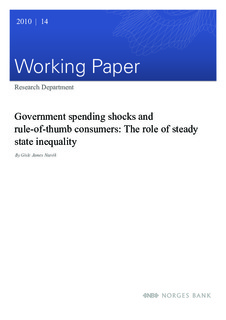Government Spending Shocks and Rule-Of-Thumb Consumers: The Role of Steady State Inequality
Working paper
Published version
Permanent lenke
http://hdl.handle.net/11250/2497449Utgivelsesdato
2010Metadata
Vis full innførselSamlinger
Sammendrag
Galí, López-Salido, and Vallés (2007) suggest that because part of the population follow a rule-of-thumb by which they spend their entire disposable income each period, private consumption responds positively to deficit-financed increases in government spending. Key to this result is a centralized labor market. I show that the ability to explain the positive consumption response as a consequence of rule-of-thumb behavior hinges on the arbitrary assumption that wealth is redistributed across households in steady state. Inequality leads to equilibrium indeterminacy and undermines the theoretical foundation of the centralized labor market.

